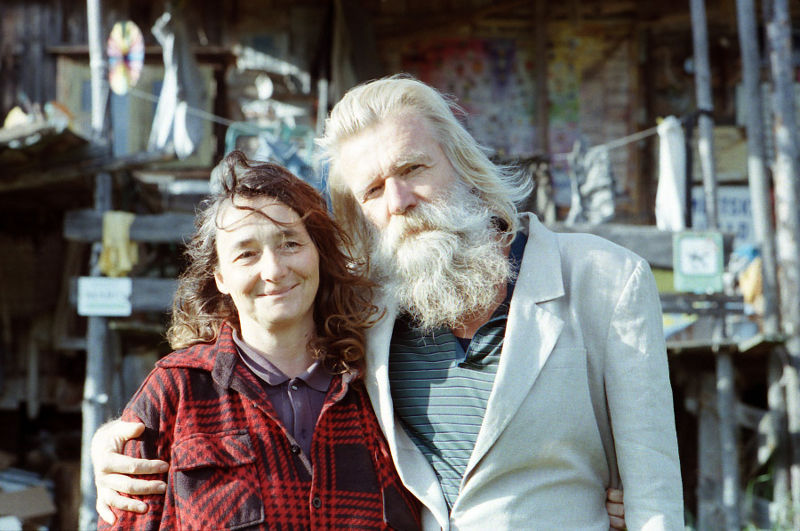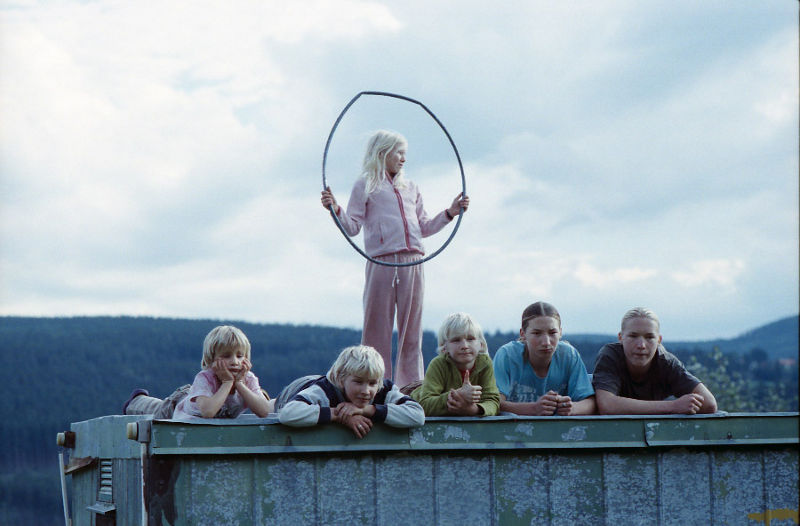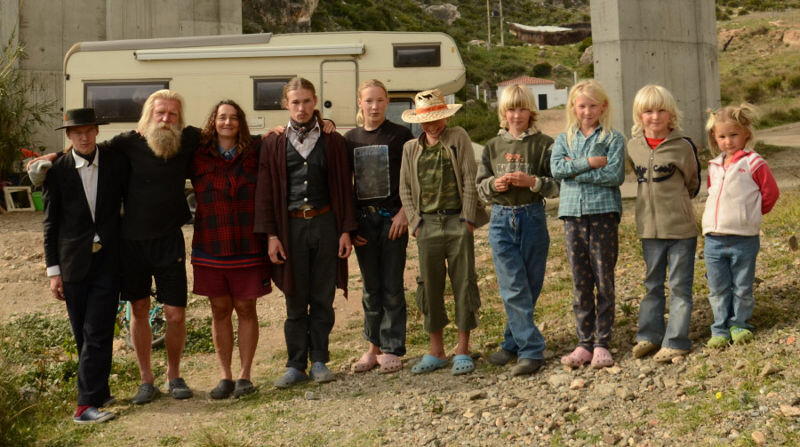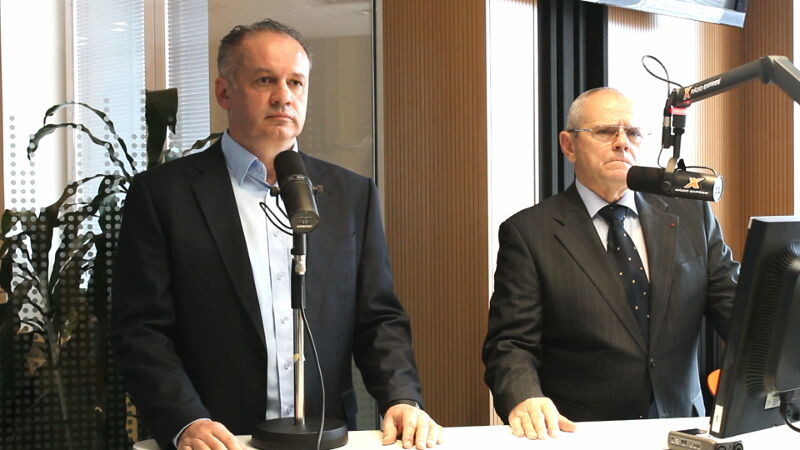Addicted to Living Together
Petr and Simona are a married couple living with their nine children in wagon trailers in Šumava mountains on meadow in harmony with nature. Every winter, they relocate to Spain where their oldest sons play hand-made guitars. Every aspect of the family life is controlled by the despotic father – so how does such a cohabitation work, or is even possible? We have invited sociologist Ivo Možný (IM), clergywoman Sandra Silná (SS) and women-rights expert from non-governmental organisation Nesehnutí, Petra Havlíková (PH), to discuss Eva Tomanová’s film Always Together that depicts a family life isolated from consumer society.
IM: Unfortunately, our only source is the footage in the film. Mlčoch family may be seen as a possible family model, but definitely not as a model family. We know how difficult it is to support a family with three children, let alone with nine. But in this case we can see that this arrangement can work even outside the traditional context of an extensive network of relatives, which is actually astonishing.
SS: This functioning model implies that the family is able to survive, but the question is, whether there is anything more to it, whether the members are convinced that they live their own life or whether they are only some cogwheels in a system created by their father and husband.
PH: It more-or-less stands and falls with the hierarchical arrangement of the relations inside the family and on the father. When watching the film, I repeatedly imagined what would have happened if he suddenly disappeared. Because he was in charge of everything, including what clothes will be washed and when. And I was surprised how little the children talk with their mother. There was perhaps only one moment in the film – when the eldest daughter was writing a letter to her mother.
IM: I can’t imagine such a family arrangement without a hidden female profile; traditional patriarchies always feature two control systems. Behind the visible face of the patriarchy lurks the invisible structure of female power. In our civilisation context, the most developed patriarchy was the world of early knights in the 11th and 12th century. The study Women of the 12th Century by French historian George Duby indicates that mighty knights were in fact afraid of their spouses. They went on their expeditions where they would enjoy a safe male-dominated environment. And it was their fear that made them lock their wives in chastity belts.
Psychological abuse
SS: Metaphorically speaking, the nine children can in this case serve as a modern chastity belt – preventing the wife from leaving home even if she wanted. Simona herself admits that they have gone through rough times, but she could not leave the family because Petr would take the children away. She is, so to speak, under his thumb. I would like to know if this was their initial agreement, as a couple, to have so many children in such conditions.
PH: The film does not show a “standard” model of a patriarchal family, such characteristics would, in my opinion, be deceiving. I would rather call it domestic violence or psychological abuse. When I discussed the film with people around me, many of them, perhaps all of them, had completely different expectations. They expected the film to depict an idyllic family that decided to free themselves from the shackles of society, but they were leaving with the feeling that the film showed more violence than action movies.

Always Together
IM: The psychological aspect of the film is, indeed, a primary one. But each sociologist knows that energy plays the same role in physics as power in society. The ones with power dominate the arena, and the power game holds the society together. The film is also about the power game in the family.
SS: From the perspective of a clergywoman, the degree of power seems to be arguable. The father mentions God at several points in the film. And it seems that he is trying to raise his family with Christian values. But a family living according to Christian principles should not be built on power and on the ability to seize it. Such a family should draw on the improvement of their humanity and the knowledge of what they are, why they are here and how can they affect others and the surroundings through love. In the case of the Mlčoch family, as portrayed in the film, this is disputable. I even had the feeling that it sheds a somewhat negative light on contemporary church.
IM: Instead of power, we can talk about strength. And love can be “strong”.
Society's fare dodger
PH: The father of the family is a very pragmatic person. Although he refuses to live within the framework of our society, he is able to accept some of the state institutions. He deliberately sends his children to school for tests and exams as he is very well aware that if he failed to do so, he would face serious consequences and social workers could take his children away. And although he claims he wants to raise his children to become decent people who will be beneficial for the society, he does little to teach them how to communicate. Or practically nothing at all.
IM: Yes, this is clearly a fare-dodger situation – someone who uses the advantages of the work of others, without contributing in any way. Like beavers – from time to time, a cunning individual appears that does not join in to build the dam. There is enough fish behind the dam, so why bother? And the Mlčoch family acts like such a cunning beaver. They are living outside the society, but, don’t get them wrong, they know well how to use its services when in need. For instance, it is unconceivable that these eleven people could do without healthcare services. Today, they are still young and healthy, but at least when they grow old, they will cost us, tax payers and the state, a pretty penny. This, actually, is obvious from the film’s opening scene. The father goes to an office and tells the clerk to pay, but the system asks – do you contribute? He wants to live according to his own rules – that’s how he is, fair enough, hats off to that. But the problem is that it is only about himself, he is unable to prepare his children for life outside the confines of the family. His children don’t have his confidence and ability to make great sacrifices for being different and living unconventionally.

Always Together
SS: The kids cannot even put a single coherent sentence together. Any dialogue in the family is absent. All communication takes place only on the principle of instructions given out by the father. The question arises – how can children raised in this isolated way have a clue about living in the society, or becoming independent? What could be beneficial about this life in Šumava in wagon trailers? If you expect to see a film about an alternative way of life where all of the adverse symptoms of consumerist society have been eliminated, you will most probably go home disappointed. I am not sure if anyone would choose to live in such a family arrangement.
PH: I guess that the film’s advertising campaign actually inspires these expectations, when asking: is there a recipe for an ideal family? But the film’s goal was apparently not to show an alternative to the consumerist way of life.
SS: Always Together in a way says that you can live this kind of life, but you have to bring some sacrifices. But in this case, the price they pay is huge.
IM: It’s like a drug. First, it gives you what you desire, but in the end, it takes everything you have.
Trailer: Always Together
Translated by Barbora Rozkošná



